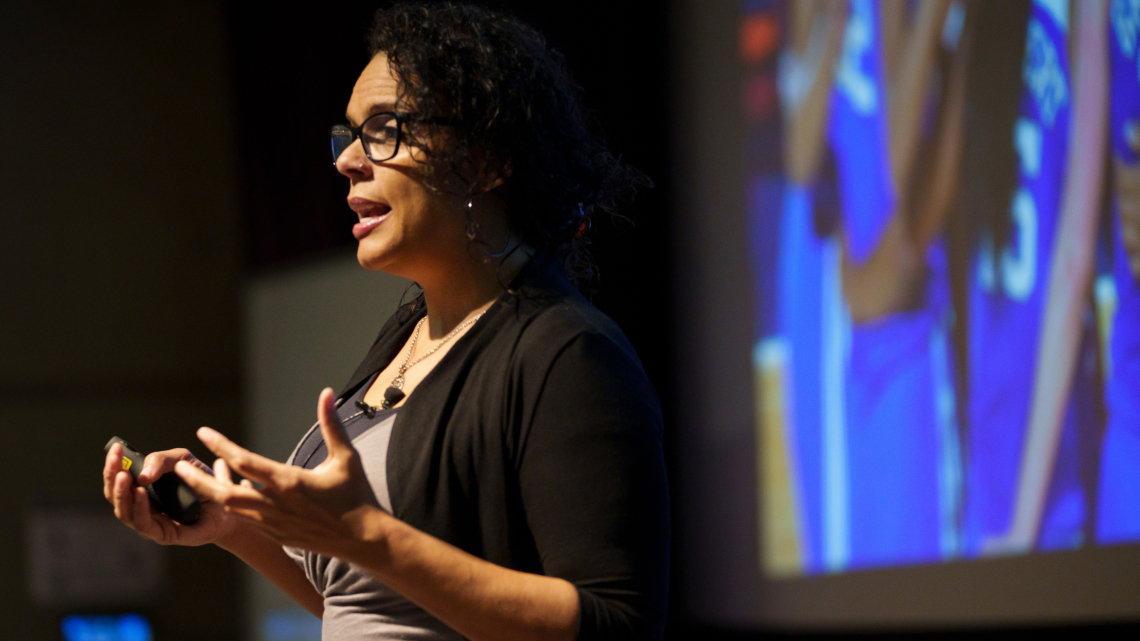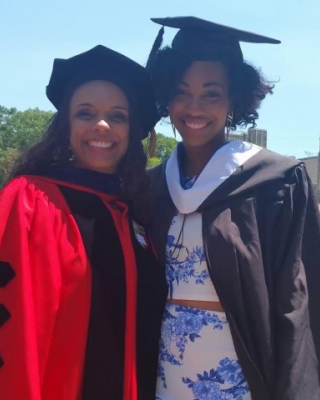Makeba Wilbourn is Helping Students Find Their Voice
It’s not often that a Duke professor is introduced with a bio that boasts attending middle school with Snoop Dogg, but that’s just how Makeba Wilbourn rolls.
A photo of Wilbourn, associate professor of the practice of Psychology and Neuroscience, and rapper Snoop Dogg flashes across the massive auditorium screen and she tosses up a west coast hand symbol and a proud smile to the packed 300-student class.
An expert on language development, Wilbourn presents a guest lecture each term to the department’s mammoth flagship course, Psych 101. Designed as a dynamic and engaging lecture — at one point student volunteers come onto the stage to play a game about speech norms — it is a masterclass on intentionality, providing social capital to students in the room who might feel out of place, unseen or underrepresented at Duke.
“Course readings, visual examples and lectures can focus almost exclusively on white, middle-class, heterosexual populations,” Wilbourn shared. “If and when people of ‘other’ are included, it is largely from a deficit perspective. I am committed to changing that message.”
“I love having Dr. Wilbourn guest lecture on language,” said Bridgette Martin Hard, professor of the practice of Psychology and Neuroscience. “Not only because she's an expert in the topic, but also because she has a style of engaging students that is incredibly interesting, authentic and, frankly, hilarious. It helps them not only discover an interest in the topic of language but also realize that faculty at Duke are fun, interesting people who maybe they want to forge connections with.”
Forging connections with students is something Wilbourn has excelled at during her 15 years at Duke, often serving as a mentor to Black and first-generation students who rely on her as a trusted guide to navigate spaces at Duke that might feel unwelcoming.
“I’ve referred five Duke student friends to her over the years,” said Urina Harrell, a Duke Psychology alumna and the founder and CEO of a Los Angeles-based digital marketing and social impact firm.
“Once a professor gets on the books as being someone who will help, then it becomes a referral system to those in need,” Harrell said. “Makeba is a safe place.”
When Harrell, a former Duke track and field student athlete who received full tuition assistance, experienced racially charged encounters, she went to Wilbourn for guidance. “Assumptions were made about why I was at Duke,” Harrell said.
“What happened to me a lot was that faculty would assume something I wrote should be cited from a different source, instead of it being from my personal knowledge base,” Harrell explained. “I needed someone to coach me on how to explain to professors ‘no, this is actually my voice.’”
As an unofficial advisee, Harrell learned from Wilbourn ways to navigate a predominantly white institution, something Wilbourn is intimately familiar with as a first-generation college student and a Black-white biracial person.
During her Psych 101 lecture, a topic Wilbourn addresses is the duality of code-switching, which is the act of transitioning into different modes of communication — dialects, languages, accents, or nonverbal forms of communication — depending on a particular social or cultural context, which is a common experience for many Duke students.
In her lecture, Wilbourn demonstrates her own code switching by moving between a “white soccer mom-style” dialect and an African American English dialect. “For the students of color in the class, I think this is a very relatable example,” Hard said.
Wilbourn prompts students to consider their own notions of code switching by showing the class disparaging media headlines in response to a postgame interview with professional football player Richard Sherman. Wilbourn plays a video of Sherman’s on-field comments, followed by a classroom interview at his alma mater, Stanford University. The side-by-side videos illustrate the alternate use of two varieties of dialects in different contexts, on the field and off the field.
Without hammering the point, Wilbourn challenges students to question their own biases, illuminating the unfair standards and harsh criticism that Sherman received as a Black man, one headline calling him a “thug.”
“Socially savvy people appropriately adapt their communicative styles depending on the context,” she said. “None of us speak the same way in a job interview as we do hanging out with our friends. But, for some groups, failure to code switch can be especially costly.”
Like Sherman, who grew up in Compton, California, and attended an elite university, Wilbourn grew up in Long Beach and attended Cal State Fullerton, later receiving her Ph.D. from Cornell University, where having one foot in two worlds dramatically changed her world view.
Wilbourn’s time at Cornell showed her the type of service and increased emotional labor often required of Black scholars maneuvering predominantly white spaces in higher education. “Before I even stepped foot on Cornell’s campus, I had already been ‘elected’ as the first-year representative for the department’s diversity committee,” she said.
At the same time, Wilbourn recognizes the gravitas that accompanies a degree from an affluent institution and the impact it’s had on her career — and can have on the careers of her students.
For Harrell, who attended a predominantly Black high school, there came a point where she wanted to transfer. “I didn’t know if Duke was the right place for me,” she said.
Wilbourn helped persuade Harrell to stay at Duke by asking her a series of questions about what it would mean for her future and that of her family. “Has anybody from your family attended a school like Duke?” The answer was no. “What would it mean for your nieces or nephews to see you graduate from Duke?”
“Makeba really helped me navigate that time,” Harrell said. “She asked me all the right questions and she was 100% right.”
As an entrepreneur in her tenth year of business in a company she created as a student at Duke, Harrell sees how conversations shift when people learn she’s a Duke alum. “It changes what's possible,” she said.
Harrell realizes what Wilbourn was teaching her: a degree from Duke sets the bar higher. It impacts business opportunities and networks, and it inspires family and community members in powerful ways.
Wilbourn knows this because she’s lived it. And it’s this deep understanding that galvanizes her to give visibility to otherwise overlooked experiences, and to create a safe and inclusive space in her research lab, The WILD.
Wilbourn’s perspective, along with her specialization in language and linguistic research, drew Annika Agrawal, a senior Psychology major, to The WILD.
Based on Agrawal’s personal experience as a bilingual Hindi and English speaker, she and Wilbourn created a study that builds on research showing that kids who grow up bilingual often feel as if they have slightly different versions of their identity in each of their languages.
“I'm a child of two immigrants,” Agrawal said. “My identity has always been a little bit of a struggle for me — and it is for a lot of people like me, second-generation Americans.”
“One thing that I think makes Dr. Wilbourn different — that I haven’t gotten from any other mentor in my four years at Duke — is that I know she sees me as a person before she sees me as a student.”
“There's this feeling when you walk into her lab,” said Ph.D. alumna Kelsey Lucca. “People are comfortable. They can be themselves.”
Lucca, who worked as a graduate student with Wilbourn, is now an assistant professor of Psychology at Arizona State University studying curiosity in children. In part, Lucca was drawn to ASU, which was recently designated as a Hispanic Serving institution (HSI), because of its diverse student body.
Wanting to follow in her mentor’s footsteps, Lucca is replicating a summer program that Wilbourn created to combat longstanding issues in diversifying undergraduate training opportunities.
“Makeba taught me that it’s crucial to get students — particularly students from underrepresented backgrounds — involved in research early,” Lucca said.
This lesson has had a generational impact. “My students are Makeba’s academic grandchildren,” Lucca said. “They are in a lab in another part of the country, reaping the benefits of her mentorship and her training, and she isn’t even in the room.”
The multigenerational impact of Wilbourn’s mentorship shows up in different ways for Lucca, a white woman trained by a Black faculty member, which is not a common experience in higher education. “Makeba taught us that it’s just as important to know your t-tests and your ANOVA as it is to show up for your students of color and to be an ally.”
Like Harrell, Lucca notes the energy and hours Wilbourn spent in one-on-one conversations with students and colleagues, often behind closed doors. Working to repair harm done — racial microaggressions, students singled out to speak on behalf of an entire race or religion, antiquated terminology used out of context in lectures, sexual harassment — is invisible labor performed by Wilbourn.
“This work is not acknowledged in the same kind of way as a peer reviewed publication that goes on your CV,” Lucca said.
The burden carried by Wilbourn, and other mentors from underrepresented backgrounds, may be invisible to most, but not to their students. “Being a woman of color at Duke has been a pretty significant part of my identity,” Agrawal said. “Dr. Wilbourn is one of the few women of color mentors that I've had on campus, and I know that she understands these struggles."
As the Psych 101 lecture wraps up, a line of students forms near Wilbourn, some wanting to thank her for the fun class, others for making them feel seen.
“For many of our students of color, I am the first Black faculty they have been exposed to in college and, for some, ever,” Wilbourn said. “I think for many students, seeing diverse representation in the lecture — a Black faculty who went to school with Snoop Dogg and won an award from President Obama — allows them to see that academic success doesn’t have to come at the cost of who they are. I highlight for students that my success isn’t despite where I come from or the boxes I check, but, rather, because of it.”
_______________________
Makeba Wilbourn regularly teaches PSY 103, Developmental Psychology; PSY 435S, The Role of Race and Culture on Development; PSY 496, Distinction Thesis Workshop; and PSY 601S, Psychology Teaching Seminar.



